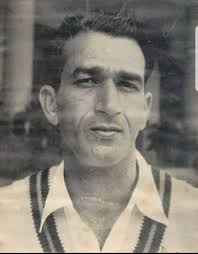Abdul Hafeez Kardar facts for kids

A.H. Kardar
|
||||||||||||||||||||||||||||||||||||||||
| Personal information | ||||||||||||||||||||||||||||||||||||||||
|---|---|---|---|---|---|---|---|---|---|---|---|---|---|---|---|---|---|---|---|---|---|---|---|---|---|---|---|---|---|---|---|---|---|---|---|---|---|---|---|---|
| Full name |
Abdul Hafeez Kardar
|
|||||||||||||||||||||||||||||||||||||||
| Born | 17 January 1925 Lahore, Punjab, British India |
|||||||||||||||||||||||||||||||||||||||
| Died | 21 April 1996 (aged 71) Islamabad, Pakistan |
|||||||||||||||||||||||||||||||||||||||
| Batting | Left-handed | |||||||||||||||||||||||||||||||||||||||
| Bowling | Slow left arm orthodox | |||||||||||||||||||||||||||||||||||||||
| Relations |
|
|||||||||||||||||||||||||||||||||||||||
| International information | ||||||||||||||||||||||||||||||||||||||||
| National sides | ||||||||||||||||||||||||||||||||||||||||
| Test debut (cap 29/7) | 22 June 1946 India v England |
|||||||||||||||||||||||||||||||||||||||
| Last Test | 26 March 1958 Pakistan v West Indies |
|||||||||||||||||||||||||||||||||||||||
| Domestic team information | ||||||||||||||||||||||||||||||||||||||||
| Years | Team | |||||||||||||||||||||||||||||||||||||||
| 1943–1945 | Northern India | |||||||||||||||||||||||||||||||||||||||
| 1944 | Muslims | |||||||||||||||||||||||||||||||||||||||
| 1947–1949 | Oxford University | |||||||||||||||||||||||||||||||||||||||
| 1948–1950 | Warwickshire | |||||||||||||||||||||||||||||||||||||||
| 1953–1954 | Combined Services | |||||||||||||||||||||||||||||||||||||||
| Career statistics | ||||||||||||||||||||||||||||||||||||||||
|
||||||||||||||||||||||||||||||||||||||||
|
Source: CricketArchive, 3 December 2008
|
||||||||||||||||||||||||||||||||||||||||
Abdul Hafeez Kardar (born January 17, 1925 – died April 21, 1996) was a very important person in Pakistan's history. He was a famous cricketer, a politician, and even a diplomat. He is best known as the first ever captain of the Pakistan cricket team.
What makes him even more special is that he is one of only three players who played Test cricket for both India and Pakistan. This happened because he played before and after India and Pakistan became separate countries. He also served as a minister in the government later in his life. Many people call him the "father figure" of Pakistan cricket.
Contents
Early Life and Cricket Beginnings
Abdul Hafeez Kardar was born in Lahore, which was part of British India at the time. He went to college at Islamia College, Lahore and later at University College, Oxford in England.
He started playing cricket for different teams. These included Oxford University, Northern India, and Muslims. He was a left-handed batsman and a slow left-arm spin bowler.
Kardar was one of the few cricketers who played for India in Test matches against England. After India and Pakistan became independent, he chose to play for Pakistan.
Leading the Pakistan Team
Kardar was chosen to lead the Pakistan cricket team in their very first official Test series. This was a big moment for the new country. They toured India in 1952–53.
Even though India won the series, Kardar's team made history. They won their first ever Test match in only their second game, which was played in Lucknow. This was a huge achievement for Pakistan.
He captained the Pakistan team in its first 23 Test matches. This was from 1952 to 1958. He helped Pakistan play against all the big cricket nations of that time.
Amazing Achievements as Captain
Kardar led his team to victory against every Test-playing nation of his era. This was incredible for a new cricket country. One famous win was against England in 1954 at The Oval.
His team also made history by winning their first and only Test match against Australia. This happened in Karachi in 1957.
Under his leadership, Pakistan won six Test matches, lost six, and drew eleven out of 23 games. He was a strong leader who wanted his team to succeed. He also believed in having neutral umpires in games. Kardar stopped playing international Test cricket in 1958.
Life After Cricket
After retiring from cricket, Abdul Hafeez Kardar became involved in politics. He was a strong supporter of Mohammad Ali Jinnah, who founded Pakistan.
He became the president of the Pakistan Cricket Board from 1972 to 1977. During his time, he worked to give more power to cricket nations from Asia and Africa in the International Cricket Council.
Kardar also worked for many good causes, helping with charity and social development. Towards the end of his life, he was Pakistan's ambassador to Switzerland. He passed away in his hometown of Lahore in 1996.
He is remembered for making cricket popular in Pakistan. He also helped train many great Pakistani cricketers. He guided the Pakistan team and its cricket board in their early years. He helped build a strong sense of pride and professionalism in Pakistani cricket.
Awards and Recognition
- In 1958, he received the Pride of Performance Award from the Government of Pakistan.
- In 2012, he was given the Hilal-i-Imtiaz award after his death. This is one of Pakistan's highest civilian awards. It recognized his great contributions to Pakistan's cricket.
- In 2019, he was honored with a Google Doodle on his 94th birthday.
Books by A.H. Kardar
Abdul Hafeez Kardar also wrote several books:
- Inaugural Test Matches (1954)
- Test Status on Trial (1954)
- Green Shadows (1958)
- People's Commitment (1971)
- The Cricket Conspiracy (1977)
- Is the Economic Future of Our Youth Become? (1985)
- Bangladesh: The Price of Political Failure (1985)
- Memoirs of an All-rounder (1987)
- Pakistan's Soldiers of Fortune (1988)
- An Ambassador's Diary (1994)
- Failed Expectations (1995)
See also
- List of cricketers who have played for more than one international team
 | William M. Jackson |
 | Juan E. Gilbert |
 | Neil deGrasse Tyson |

